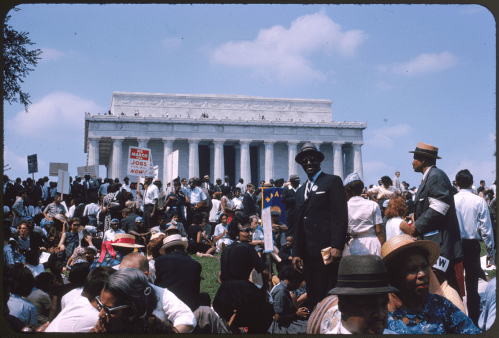
As we mark the 60th anniversary of the March on Washington, it is clear that protest politics are alive and strong in the United States. As was the case 60 years ago, gaping racial inequalities and social unrest have motivated widespread participation in marches, which over the past decade have focused on police brutality and immigration. Americans have participated at high levels in protest activities, indicating both the impressive levels of civic engagement among the public and, unfortunately, the severity of police brutality and structural racism across the country.
The Black Lives Matter protests in 2020 following the murder of George Floyd are the strongest example of the continued relevance of protest action to voice frustration and attempt to influence policy action among Americans. With as many as 26 million people estimated to have participated, it is the largest protest movement in American history.
A look at survey data from 2020 illustrates that not only was participation high overall, it was disproportionately high among Americans from diverse racial and ethnic backgrounds and young people. For example, 24% of all African American respondents in an election survey from 2020 reported attending a march or rally to support racial justice or to protest policy brutality. However, younger African American respondents between the ages of 18 and 29 were 15% more likely to have attended (39%).
As reported earlier, participation in these protests across the country was also high among Latinos, particularly among Latinos under 40. While 20% of all Latino voters indicated that they have attended a march or rally to support racial justice or protest policy brutality during the 2020 election season, 28% of Latinos under the age of 40 did so. Latinos engaging in the social movement against police brutality is reflective of the Black Lives Matter movement’s broader support outside of the African American community. For Latinos, support is also driven by shared experiences with excessive force and perceived discrimination from law enforcement. These shared experiences forge cohesiveness between Latinos and African Americans, which explains in part Black voters’ high levels of support for progressive immigration policies, including support for DACA at levels that are similar to Latinos.
Survey data can provide some insights on how effective Americans believe protest politics are at addressing inequalities 60 years after the March on Washington. Just over half (52%) of African American respondents in the Collaborative Multiracial Post-Election Survey believe that protests and demonstrations are “effective” at combating racial bias in policing or inspiring reform within the criminal justice system. This is slightly higher than perceived effectiveness of protest politics among Latinos (47%) and Asian Americans (48%), and significantly higher than among white Americans (33%).
The same trend held when respondents were asked how effective protests and demonstrations are at advancing equal voting rights for everyone, with African Americans having the highest perceived efficacy of protests at 59%, which was slightly higher than Latinos (54%). Asian Americans (48%) and white Americans (37%) are less likely to see value in protest politics to advance voting equality.
As we reflect on the 60th anniversary of the March on Washington, it is important to note the parallels in societal inequalities that have motivated Americans to turn to protests, marches, and demonstrations to express their frustration with the status quo and desire for change. The March on Washington is a symbol for that era’s fight for freedom, equal opportunity, and social justice. Given that these issues are among the top priorities for voters of color today, it is clear that protest politics will continue to be relevant in the United States. It is our hope that we will look back at 2020 as a turning point in American politics, where the need to march and protest for social change diminished as true progress began to take hold in the ongoing push for equality.
This post was originally published on this site be sure to check out more of their content.






